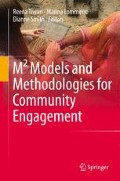Abstract
Community led capacity building applies and uses insights drawn from the community to address community concerns. Consciousness, reflection and sharing are critical steps in capacity building. The process of planning, action and reflection undertaken in this study ensured that an increasing depth of understanding was achieved by the participants. This cross-sectional, exploratory case study was conducted in 2011 in the post-conflict, transitional, developing nation of Uganda; the researchers documented changes in gender roles in courtship, marriage, education, health choices and agriculture. Twenty-one men and women in central Uganda participated in interviews and focus group discussions. The results reveal that women in rural Uganda have increasing decision-making power in the areas of agriculture, use of funds, educational choices for children, and partnerships. Women’s health knowledge is highly valued not only in the family but also in the community. The participants shared that health is predominantly the domain of women, in terms of decision-making, patient care and providing advice. Men do not feel confident in dealing with sick children or family members, and defer to women. Lessons were learnt on the relationship between gender-related decision-making, empowerment and meaningful participation and how these inter-related concepts contribute to community development. As the study progressed, men and women presented opportunities for further capacity building to play a greater role in the family and in community based healthcare.
Access this chapter
Tax calculation will be finalised at checkout
Purchases are for personal use only
References
Allen, A. (1998). Rethinking power. Hypatia, 13(1), 21–40.
Economic and Social Commission for Asia and the Pacific. (2009). Regional trends, issues and practices in rural poverty reduction: Case studies on community participation. http://www.unescap.org/pdd/publications/poverty_and_development/trends_rural.pdf. Accessed 28 July 2013.
Hanson, H. (2009, November). Planning for instability in Kampala. Paper presented at the Association for African Studies annual meeting, New Orleans, LA.
Institute for the Study of Global Prosperity. (2008). Science, religion and development: Some initial considerations. www.globalprosperity.org/library. Accessed 28 July 2013.
Kapiriri, L., Norheim, O., & Heggenhougen, K. (2003). Public participation in health planning and priority setting at the district level in Uganda. Health Policy and Planning, 18(2), 205–213.
Mathie, A., & Cunningham, G. (2003). From clients to citizens: Asset-based community development as a strategy for community-driven development. Development in Practice, 13(5), 474–486.
Mbire-Barungi, B. (1999). Ugandan feminism: Political rhetoric or reality? Women’s Studies International Forum, 22(4), 435–439.
Nikkhah, H., & Redzuan, M. (2009). Participation as a medium of empowerment in community development. European Journal of Social Sciences, 11(1), 170–176.
Paek, H., Lee, B., Salmon, C. T., & Witte, K. (2008). The contextual effects of gender norms, communication, and social capital on family planning behaviors in Uganda: A multilevel approach. Health Education & Behaviour, 35(4), 461–477.
Ryan, W. (1995). Culture, spirituality, and economic development: Opening a dialogue. IDRC. http://www.idrc.ca/EN/Resources/Publications/Pages/IDRCBookDetails.aspx?PublicationID=274. Accessed 28 July 2013.
Schafft, K., & Greenwood, D. (2003). Promises and dilemmas of participation: Action research, search conference methodology, and community development. Community Development Society Journal, 34(1), 18–35.
Viswanathan, M., Ammerman, A., Eng, E., Garlehner, G., Lohr, K. N., Griffith, D., et al. (2004). Community based participatory research: Assessing the evidence. Evidence Report/Technology Assessment (Summary), 99, 1–8.
Wallerstein, N., & Berstein, E. (1988). Empowerment education: Freire’s ideas adapted to health education. Health Education & Behavior, 15(4), 379–394.
White, S. (1996). Depoliticizing development: The uses and abuses of participation. Development in practice, 6(1), 6–15.
World Bank. (2005). Uganda from periphery to center: A strategic country gender assessment. Office of the Sector Director poverty reduction and economic management Africa region (Report No. 30136-UG). http://www-wds.worldbank.org/servlet/WDSContentServer/WDSP/IB/2005/03/25/000090341_20050325085641/Rendered/PDF/301360UG.pdf. Accessed 28 July 2013.
World Health Organization. (2008). Closing the gap in a generation: Health equity through action on the social determinants of health. Commission on the Social Determinants of Health. Geneva: WHO Press. http://www.who.int/social_determinants/thecommission/finalreport/en/index.html. Accessed 28 July 2013.
Wyrod, R. (2008). Between women’s rights and men’s authority: Masculinity and shifting discourses of gender difference in urban Uganda. Gender and Society, 22(6), 199–823.
Acknowledgements
We would like to acknowledge Robinah, Julius and Emmanuel for their assistance in in the field during data collection. We would also like to thank the community members for giving so generously of their time. We are thankful to the Transcultural Health Improvement Programme, School of Nursing and Midwifery, Curtin University, for funding this study.
Author information
Authors and Affiliations
Corresponding author
Editor information
Editors and Affiliations
Rights and permissions
Copyright information
© 2014 Springer Science+Business Media Singapore
About this chapter
Cite this chapter
Singh, D., Lample, M., Jones, M., Earnest, J. (2014). Capacity Building and Community Development: A Community Dialogue on Equality in Rural Uganda. In: Tiwari, R., Lommerse, M., Smith, D. (eds) M² Models and Methodologies for Community Engagement. Springer, Singapore. https://doi.org/10.1007/978-981-4585-11-8_3
Download citation
DOI: https://doi.org/10.1007/978-981-4585-11-8_3
Published:
Publisher Name: Springer, Singapore
Print ISBN: 978-981-4585-10-1
Online ISBN: 978-981-4585-11-8
eBook Packages: Humanities, Social Sciences and LawSocial Sciences (R0)

